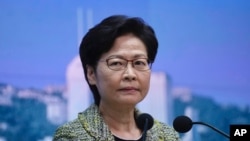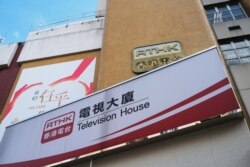Plans by Hong Kong's public broadcaster to partner with Chinese state media have furthered fears that it is aligning closely with Beijing.
Hong Kong Chief Executive Carrie Lam announced last week that Radio Television Hong Kong (RTHK) will join forces with the China Media Group as part of efforts to promote patriotism.
Under the partnership, mainland Chinese programs will be aired in Hong Kong to provide viewers with a "thorough understanding of the struggle and development of the Communist Party of China and nurture a stronger sense of patriotism," Lam was quoted as saying in the English-language South China Morning Post.
Media watchdogs have warned that the partnership could interfere with RTHK's editorial independence. The public broadcaster is bound by its charter to be independent and exempt from political interference.
China Media Group, the organization RTHK is partnering with, was founded in 2018 under the Communist Party of China's Publicity Department. The group is the holding company of major state media including China Central Television (CCTV) and China National Radio.
Ronson Chan, chair of the Hong Kong Journalists Association, told VOA he was not surprised that RTHK would broadcast more shows and commentary "hosted by the pro-Beijing camps," saying RTHK is coming "closer and closer to Beijing's stance."
The public broadcaster's communications team confirmed the partnership to VOA but denied that it would impact RTHK's charter.
A spokesperson for the broadcaster told VOA in an email message that RTHK's mission includes "engendering a sense of citizenship and national identity through programs that contribute to the understanding of our community and nation."
"Broadcasting more mainland programs and developing a long-term partnership with the China Media Group is in line with the charter," the spokesperson said.
Period of change
The partnership is the latest in a string of changes at RTHK since its new director of broadcasting, Patrick Li, took the helm in March.
Popular TV shows were axed for alleged bias, and the contracts of some journalists were not renewed. In May, Lam was granted her own show in a move deemed by critics as political propaganda.
An RTHK employee told VOA in April that rapid changes were pushing the broadcaster into the direction of China's state-controlled media.
"It's looming over us," said the employee, who requested anonymity.
Chan, of the Hong Kong Journalists Association, said that since Li's appointment, RTHK has lost its editorial independence.
"I don't think that RTHK remains independent, but a government department only," he told VOA.
He cited recent changes, including a memo sent to staff last month, that showed RTHK aligning more closely with Beijing.
The memo ordered staff to "exercise a high level of caution" when referring to Taiwan and warned against calling it a "country" or "government" or referring to Taiwan's leader-president, Tsai Ing-Wen, as "president."
Taiwan is a self-governed island democracy, but China claims it as a renegade province that will one day be reunited with the mainland.
RTHK also deleted thousands of pieces of footage archived on YouTube and Facebook and disabled the comments section on its Twitter feed.
A separate RTHK employee, who also asked to remain anonymous, told VOA the new management wants to "control everything and minimize risk."
"This management, they are not thinking anything from the angle of production. All they are thinking is management and how to make management easier, how to make things controllable," the journalist said.
When VOA asked RTHK for comment, the broadcaster's communications team declined to elaborate, saying its social media policy is "an internal administrative matter."
New 'creative' team
The RTHK employee also believes a newly installed "creative" team is handling the collaboration with China Media Group.
"This creative unit is led by these people who are willing to carry out missions that we don't want to do," the employee said, adding that the unit is removed from other departments.
But the employee admitted little was known about what the collaboration would look like.
"I don't know about the partnership. But we know the direction is to take more CCTV shows, and I don't know what is in the pipeline of discussion, but that's definitely the direction."
The employee described the changes as "heartbreaking" as a once transparent and vibrant culture was replaced with lack of communication.
"We always see ourselves as serving the people, but now this is turning into a mouthpiece. We treat ourselves as the self-servants to the people. But now whatever they are going to do is to be a servant to the government and authority," the employee said. "There is no editorial independence here anymore."
RTHK is Hong Kong's sole public broadcaster. It launched its first radio program in 1928 under the British Hong Kong Government and later became independent. It now produces content in three languages for 10 radio and TV stations and has a multimillion-dollar government-funded budget.
The changes at the broadcaster come as media in Hong Kong adapt to a national security law, introduced after the pro-democracy protests in 2019.
Since the law took effect last summer, more than 100 political and opposition figures and protesters have been arrested and one person has been convicted. Authorities have banned protest slogans and removed pro-democracy books from libraries and schools.
The pro-democracy newspaper Apple Daily was forced to close, and several of its executives were arrested, and some civil society groups are disbanding because of fears concerning the law.






